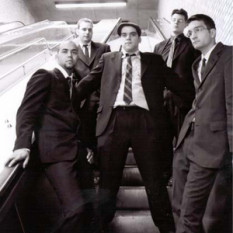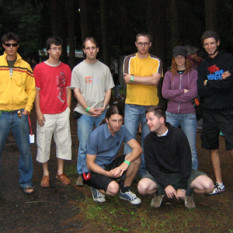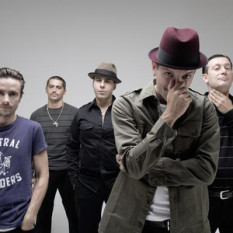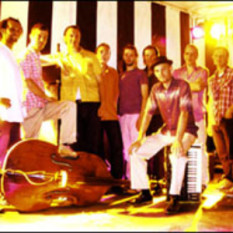Straight from the heart of Boston, eight young and ambitious musicians have come together to form what is arguably the city’s most diverse popular band. As stated right in their name, The Eclectic Collective is just that—a collective of artists from numerous facets of the local music community, coming together to make an entirely new sound. Drummer Sheel Davé is known for his role in the city’s experimental metal group IREPRESS, while other members such as vocalists Dua and Noni Kai bring influences from a variety of urban music styles. Over the recent years, the group has worked together extensively in crafting a sound that intimately combines rock, R&B, soul, jazz, hip-hop and more into one new identity. Now, with their sophomore album The Flux on the market and a US tour well underway, we hear what the band has to say about their growing career.
SF: It’s hard not to notice EC’s large roster of members. You’ve got 8 talented musicians, all hailing from various cultural and musical backgrounds, creating a sound that’s as cohesive as it is diverse. How did you all manage to get together?
Sheel Davé (drums): To make a long and boring story short: I was filling in for a band that consisted of Santi, RP, and Graham, and at the same time I was writing songs with Salim and Dua. I decided to bring both sides together and the rest is history.
Salim Akram (guitar): It was more natural than most people would think. This question gets asked a lot. Someone will just come up with a riff and everyone else will just vibe off of it and sort of add their piece of the puzzle. We don’t force it. It’s not like we lock ourselves in a room and say we are going to write a song that feels like this or sounds like that.
SF: EC’s sound incorporates influence from several genres, namely rock, soul, hip-hop and R&B. Some have compared you to bands like Gym Class Heroes, At the Drive-In, and even the Fugees. How does EC set itself apart from other groups out there who are working with the same kind of sounds?
Sheel: We don't intentionally try to sound a certain way and we don't intentionally try to set ourselves apart from everyone else. I understand that if we think we are doing something "original" or completely unique, there is always someone else doing it as well. I don't think any musician/band/artist should take themselves too seriously, especially the way the music industry is now. We can't really worry too much about setting ourselves apart, or setting ourselves into any sort of genre. It's too much of a hassle. I give props to the three artists you mentioned, because they crossed over into many different genres and were very successful with it. Some of the best artists/bands/musicians are overlooked and we realize we just have to create something that comes natural to us when it comes to writing music, otherwise we will constantly be thinking about how we can fit in or how we can set ourselves apart. Record labels, show promoters and bands need to start taking more risks because if they don't, no one is going to take a risk in them. In general, it has all been a natural progression with us. Our next record will probably sound completely different than the first two.
Salim: I think it’s unique in a way that it can strike chords with many different kinds of people. We have shared bills with hip-hop bands, Maceo Parker who is a jazz funk legend, Fishbone who is a ska punk-rock legend and then we’ve played on metal shows and we have turned heads in every situation. So I think because we aren’t trying to be something we aren’t sets up apart from all these other bands who were probably playing rap-rock when it was cool, and now are dressing in tight pants and wearing eye liner.
SF: Sheel, EC and Irepress are two very different bands. How do you juggle being a member of both, and does the work you do in either project have any influence on the other?
Sheel: It is difficult juggling both bands. Fortunately both of the bands are good friends with each other so there is an understanding on both sides that both bands’ time will come. I absolutely draw influences from both bands and bring them to each side. Playing in both groups keeps me refreshed and in love. I would like to see both bands tour together at some point. I need a roadie.
SF: While listeners can make all the comparisons they like, it’s always interesting to hear where the band members are actually getting their inspirations from. What musicians (and any other artists) do you feel have had an impact on the music you create in EC?
Sheel: I haven't really been listening to much new music lately, which is sad, because I am sure I am missing out. I have been and always will be drawing influences from fellow musicians and band members. If I had to name an artist it would have to be Michael Jackson. I am a huge fan of vocal melodies and there is no one that can touch him melodically and rhythmically.
Salim: I drew influences from all the music I grew up listening to. I was mostly a hip-hop head when I was a kid and then Green Day’s Dookie changed my life. First rock record I owned. From then on it was mostly things like Rage Against the Machine, Deftones, early 311 records, Nirvana, the Chili Peppers things like that. I used to practice the riffs in my room when I was in high school. But mostly now I draw influences from the music today and the people I play with. It’s important to have a grasp on what’s going on around you. But I never forgot where all this stuff came from so I have always been a fan of classic Soul and R&B.
SF: At times, your new album The Flux definitely seems to move a little bit beyond a hip-hop or urban style and more towards an edgier, rock n’ roll sound. Granted, all the other elements are still there, but it’s certainly a noticeable upgrade. What caused you as a group to decide to take things up a notch?
Sheel: I think we were confused on the first record. I guess you could call it an experiment of sorts, but I am proud of it for what it was. There are still 2-3 songs on the first record that I still enjoy. As far as my drumming on the new record, I went back to the high energy, loud drumming that I originally was used to and it seems to work with what everyone else in the band is doing. Hip-hop beats/grooves are rooted with heavy kick drum and bass sounds and although this new record can't really be called "hip-hop", it still has those grooves, but in a more aggressive, rock n’ roll approach.
Salim: It just seemed like a natural progression. The song “Useless Parade” on the first record was the first song that we had written that I felt had “the edge.” It was one of the first songs that I felt was unique and had our own defined sound to it. And it seemed like most of the songs after that kind of took that same route of edgier rock sound. Our live show was getting geared more toward high energy, being loud and bugging out on stage, so the goal on this record was to capture as much as that as possible.
SF: The lyrics in your music seem to touch upon some interesting subjects, mainly romantic hardships and political injustice. Where do you draw inspiration for the words that you use in each song?
Sheel: (joking) I write all the lyrics, and all of my lyrics are about how amazing Falcor from the Neverending Story is.
SF: Beyond just the great tracks that it holds, one of the most impressive features of The Flux is its highly professional production quality. I understand that Michael Barbiero, a 3-time Grammy winning mixer (Guns n’ Roses, Metallica, John Lennon, etc), worked with you in mixing the album’s tracks. How did you manage to get him on board? What was it like working with him?
Salim: Mike Poorman (Strangeway Recordings) is a god amongst men…a lot of it started with him. We spent 2 days with him trimming the fat from the songs we had written and then we went up to the studio and it was game time. He made sure we did it right…it was refreshing to work with a kat that had control and a vision from start to finish. In terms of Barbiero, Poorman put us in touch with him, because they have solid relationship we worked out the particulars and the rest is history. We sent the tracks out to him and he just mixed the piss outta them. Unfortunately we didn’t get a chance to sit in the studio with him and watch him do his thing. It was done over emails and servers. It was cool to have a guy who is in his own realm a god, working on our record and enjoying it though.
SF: After producing two incredibly solid albums with a fun and very accessible sound, it’s somewhat shocking that EC is still without a record label. I understand you’ve been turned down by some labels in the past…What seems to be their issue with you guys? Has not getting signed been discouraging or troublesome for the group at all?
Salim: We pitched ourselves to labels based off the first record, and for what it was it was a good record but the general responses we got back was that it was too many different styles. Labels want cookie cutter bands that they can just package up and sell, they don’t have time for bands that they don’t know how to market or are unsure how to market. So that was their problem with us, they told us that we could have lucrative careers as touring musicians but they were unsure how to market the music. I don’t think it has been discouraging at all. This is the day and age were you have more control over your destiny in the industry and it’s the age of mash ups again. Labels are going to start taking chances on bands again. Just look at Gym Class Heroes; they’re the fish out of water on Fueled by Ramen, but they took a risk and they are having the last laugh. People are looking for something fresh. Our advantage is that we are proving to people and doubters without a label that we are worth taking a risk on, we just got our fingers crossed they eventually catch on, but if not we will just keep doing our thing.
Sheel: The industry is obviously in a very sad state right now and a lot of label execs aren't ready to take a risk with a band like us. Execs are just worried about keeping their jobs at this point. I guess diversity is a scary thing to some labels. It has definitely been a bit discouraging, and has made us somewhat bitter towards the music industry, though it has made us stronger and forced us to realize how much a band can do on its own. We have a lot of good people on our side that believe in us, and as long as we continue to create authentic music without thinking about what some A&R at Sony is going to think of us, I think we will be just fine.
SF: You’ve just finished your second album and you’re getting ready for a rather substantial tour. What’s next for The Eclectic Collective? What new directions (if any) would you like to see the group exploring in the future?
Sheel: I would like to see a collaboration with Whitney Houston and a supporting slot on Michael Jacksons next tour. I would also like to tour Western Europe and the UK.
Salim: We have 2-3 week tour in the end of May/June to the South to help push the record, and then we just got hooked up to support and back up Slick Rick on the East Coast in July for like ten dates, which is cool. Then, maybe a bit of time off to start working on some new material. We already have like 3-4 new songs that we are working on that we would love to record. We are just going to keep doing our thing and see where it takes us...
--------------------------------------------------------------------------------------------------
You dont become Bostons most boasted big band overnight. Should The Eclectic Collective debut slide under the right doors and win next years Grammy for Best New Artist, it would be a complement, but it would also be bullshit.
Mission Developing... The snowball first rolled in 2001, when vocalist Dua Boayke and guitarist Salim Akram tag teamed as an acoustic duo called The Kaizen Komplex. The two unraveled politically fueled poetic sets for the coffee shop crowd.
Mission Begun... In 2003, the group gained momentum when drummer Sheel Dave of the Boston metal magnate Irepress signed on to help Salim and Dua twist unique blends of jazz, hip-hop, rock and rhythm. They started calling themselves The Eclectic Collective, but they hadnt truly earned the title yet.
Mission Rolling... Late in 2003, the unit emboldened its eclecticism when keyboardist RP Thompson, bassist Graham Masser, turntablist Special Blend and guitarist Santi Araujo joined the ranks. The extended rhythm section added not only to the crews instrumental depth, but to its multiracial fabric: not only can EC jam, but a group shot of its roster would make for a proper college brochure cover.
Mission Expanded... By 2004, the group had locked down the Boston scene. With the range to serenade rock, jazz and blues clubs, plus the addition of trumpet playing rap artist AfroDZak, EC arrived at the ability to provide undeniable relief from pop culture and its predisposed restrictions on modern music. And to ice the layer cake, they enlisted queen vocalist Noni Kai to beef up the soul and saxaphonist Rob Oswald to polish the brass. The sound finally came full-circle at the rare intersection where jazz, soul, metal, rock and boom bap rev their engines in unison.
Mission Accomplished... With many of their contemporaries rushing annual projects, EC deliberately focused on the necessary efforts needed to get ten individuals clockworking well-synched tracks. The result of their live grind and studio hustle is Time Flies, the bands ten-song debut that transcends niche nonsense and showcases the groups dynamic structure, conglomerate of talent and massive crossover potential in every genre outside of honky tonk.
.
All albums
You can find information through the best music search engine - Muzlan.top 😊All materials on request "The Eclectic Collective" are available on page The Eclectic Collective
Yes of course. You can listen tracks on the page The Eclectic Collective
Yes of course. You can download tracks on the page The Eclectic Collective
This page is found by queries: The Eclectic Collective song listen, The Eclectic Collective flac, The Eclectic Collective songs download, The Eclectic Collective song download, The Eclectic Collective all mp3




